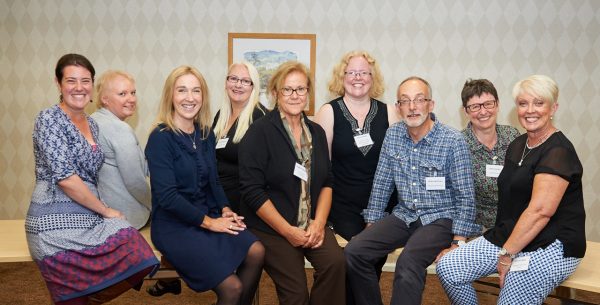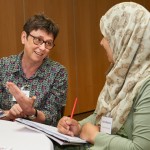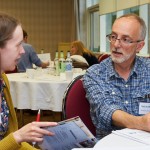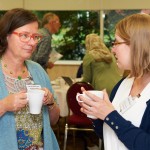Developing Research Priorities in Care Homes into Collaborative Projects
22 August 2016
A recent workshop organised by the Centre for Trials Research and PRIME Centre Wales brought together experts in Wales with an interest in care for the older person, so they could begin to develop research ideas collaboratively.
Establishing research priorities
The Centre for Trials Research recently conducted a Research Priority Setting in Care Homes study which invited care home staff throughout the UK to act as an ‘expert panel’ to identify the areas where more research is needed for older people living in care homes. We used consensus building techniques through a series of rounds to identify a set of the 15 top priorities for future research. Our aim is that sharing the findings with a range of practitioners, researchers, and funding bodies will help to ensure the future research agenda is focused on the areas of greatest need.

All-Wales research workshop
Following on from the study, we organised a Research Development Workshop to bring together a wide range of researchers, practitioners, and others throughout Wales to start developing proposals to address the questions that have been identified as priorities during the study. This event was the first of its kind for us, and was designed for those with an interest in this area who wanted to find collaborators to establish research development groups.
The workshop aimed to bring together people from a range of backgrounds, specialities, skills and experience from both health and social care. This was to reflect that the care provided in care homes is unique as it encompasses a range of health conditions, as well as features associated with ageing, such as frailty and cognitive impairment, and incorporates social care as well as health care. Those attending could either ‘pitch’ their idea for a research proposal, or join researchers with similar interests to develop proposals.

Wide range of delegates
Around 50 people attended, including representatives from 4 health boards, a range of Schools and Centres across 4 universities, third sector organisations, care regulators, and a care home team. Some were experienced researchers, whilst others were newer to research but had invaluable hands on experience working with the care home sector. All had been provided with a briefing report that added context to the research questions identified as priorities, summarised some of the existing evidence, and relevant guidelines and policies.
The day started with presentations from the study leads (Professor Kerry Hood, Dr Fiona Wood, Victoria Shepherd), which provided information about the work of the Centre for Trials Research and PRIME Centre Wales, set the scene for research in care homes, and the results of the priority setting study.
Delegates who were ‘pitching’ a research idea then presented their proposal to the whole group. Each of them explained:
- the priority being addressed
- the aim of their project
- the initial research design.
A range of research proposals were presented. Two predominant themes emerged:
- delivery of truly person-centred care
- advanced care planning towards the end of life.

Workshop structure
The theme of the workshop was gemstones. As well as recognising that older people are valuable to society, the concept was that polishing and refining a rough uncut ‘gem of an idea’, could result in a bright and shining jewel.
“…. like uncut diamonds – discard them and their value will never be known. Improve them and they will become the brightest gems in the useful life.” Ralph Waldo Emerson
Each research proposal was assigned a gemstone which those wishing to contribute to developing it, or just meet and link with the person ‘pitching’ it, could use to identify that topic and person.
With refreshments in hand, delegates joined discussions around those topics that they were interested in, contributing ideas, advice, and contacts. People could move from one gemstone round table discussion to another, or remain and continue exploring an idea or approach further with the development group forming around the proposal. This free-form style was well suited to developing proposals which built on the wealth of experiences and perspectives from other researchers and stakeholders, and their previous work. The phrase ‘Oh, you might be interested in ……..?’ echoed around the room.
Support from experienced researchers
Experts from the Centre for Trials Research with experience of research in care homes helped each group to develop their research ideas:
- providing specific advice on trial methodology
- giving guidance on statistics
- how to conduct research in this setting
- discussing issues around informed consent and recruitment.
They moved between the development groups and were also able to signpost to other sources of advice or support, including potential funders. All those attending were informed about the support available when planning and developing health and social care research from the free Research Design and Conduct Service (RDCS) that operates through 3 regional centres in Wales.
Fortified by lunch and an endless supply of tea and coffee, discussions continued during the afternoon session, which culminated in the lead for each proposal feeding back to the whole group about how their proposal had developed during the workshop, key new approaches or methods that had been suggested, and the next steps.

Forming research teams
The diversity of delegates, and an interactive format, meant that those attending had a real opportunity to meet and engage with individuals and organisations that they wouldn’t otherwise encounter, but who all shared a common purpose – to come together to do research that could make a significant positive difference for those requiring long term care.
Feedback at the end of the day was very positive – those attending valued the sharing of expertise, knowledge transfer, and validation of their ideas, as well as the forming of partnerships. They also appreciated hearing about the work of the Centre for Trials Research and PRIME, which had been ‘de-mystified’.
The key message from the day was that this does not end here: it is just the start of joining together and contributing to a much needed evidence-base for care provided for older people in care homes in Wales and beyond.
For more information about the study, or the development of research to address these priorities, please contact Victoria Shepherd.
View Gallery
About the author
Victoria Shepherd is a research associate/nurse in the South East Wales Trials Unit (SEWTU), based in the Centre for Trials Research at Cardiff University. Research interests include: research ethics and vulnerable populations (children, older people, ITU).
- December 2025
- October 2025
- June 2025
- May 2025
- April 2025
- March 2025
- February 2025
- December 2024
- November 2024
- October 2024
- September 2024
- July 2024
- June 2024
- May 2024
- April 2024
- March 2024
- December 2023
- November 2023
- September 2023
- July 2023
- June 2023
- April 2023
- March 2023
- February 2023
- December 2022
- November 2022
- October 2022
- September 2022
- August 2022
- July 2022
- June 2022
- May 2022
- April 2022
- March 2022
- February 2022
- January 2022
- November 2021
- September 2021
- July 2021
- June 2021
- May 2021
- March 2021
- February 2021
- December 2020
- November 2020
- September 2020
- August 2020
- July 2020
- January 2020
- December 2019
- October 2019
- September 2019
- July 2019
- June 2019
- May 2019
- April 2019
- February 2019
- December 2018
- November 2018
- October 2018
- September 2018
- August 2018
- July 2018
- June 2018
- May 2018
- April 2018
- March 2018
- December 2017
- October 2017
- August 2017
- July 2017
- June 2017
- May 2017
- April 2017
- March 2017
- February 2017
- January 2017
- December 2016
- October 2016
- August 2016
- June 2016
- April 2016
- March 2016
- February 2016










































